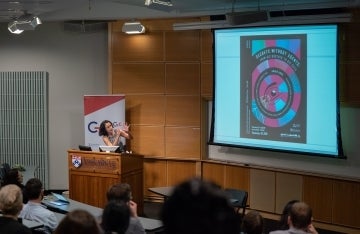
2019 CARGC Distinguished Lecture in Global Communication: Anikó Imre, University of Southern California
- Annenberg School for Communication, Room 109
"Secrets Without Agents: From Big Brother to Big Data"
This event has ended, but is available to watch on YouTube:
About the Talk
Spies have made a remarkable international comeback in popular film and TV since the early 2010s. Many of the recent TV series and feature films that revolve around spying and surveillance also draw on the Cold War for historical parallels, antecedents, or representational elements to convey a decidedly contemporary sense of ambiguity, allegory, and dystopia that is associated with the global crisis of neo-liberal markets, the erosion of trust in democratic institutions, and the emergence of autocratic leaders worldwide.
Imre probes this association further and asks why and how the memory of the Cold War is resurrected through its favored genre to lend a representative platform to current, globally shared structures of feeling. On the one hand, the implied historical parallels yield a contemporary reevaluation of the Cold War as much more complex and more thoroughly networked among national and other agents than the triumphant Western narrative of two warring empires has long suggested. On the other hand, the comparison between Cold War and contemporary manifestations of spies and spying guide us to understand significant recent transformations in the nature, effects, and experience of surveillance. This transformation involves the global political and affective impact of populism and authoritarianism; stark economic inequality; widespread digital state and corporate surveillance; a conservative backlash against women, minorities, and immigrants; the erosion of democratic institutions; the appearance of fake news delivered by algorithms; and Russia’s return to the international stage as powerful state with imperial ambitions, headed by a former KGB agent.
Equally important, the comparison between Cold War and contemporary spies highlights a radical transformation of the technological and media networks themselves from nation-based broadcast networks to streaming platforms that are themselves active facilitators of a more widespread, insidious, and inescapable sense of surveillance. In particular, Imre argue that there is a synergy between the structures of broadcast television and Cold War representations of spying on the one side and contemporary, digital, SVOD delivery and the structures of spying represented by streaming services on the other. This feedback loop between spying as content and technology compels a serious critical and historical understanding and requires creative pedagogies of interruption.
About the Speaker
Anikó Imre is a Professor of Cinematic Arts in the Division of Cinema and Media Studies and a member of the faculty advisory board in the Interdivisional Media Arts and Practice (iMAP) Division at the University of Southern California (USC). She has published, taught, and lectured widely on media globalization, television, (post)socialism, gender and sexuality, race, and postcoloniality.
She is the author of TV Socialism (Duke UP, 2016) and Identity Games: Globalization and the Transformation of Post-Communist Media Cultures (MIT Press, 2009), editor of East European Cinemas (AFI Film Readers, Routledge, 2005) and The Blackwell Companion to East European Cinemas (2012), and co-editor of Transnational Feminism in Film and Media (Palgrave, 2007), Popular Television in the New Europe (Routledge, 2012), of special issues of The Journal of Popular Film and Television on Television Entertainment in the New Europe (2012), the European Journal of Cultural Studies on Media Globalization and Post-Socialist Identities (May 2009), and Feminist Media Studies on Transcultural Feminist Mediations (December 2009). She co-edits the Palgrave book series Global Cinemas and sits on the boards of Cinema and Media Journal, Global Media and Communication, Television and New Media, VIEW Journal of European Television History and Culture, NECSUS_European Journal of Media Studies, global-e: Twenty-First Century Global Dynamics and other key publications.
This event is co-sponsored by the Russian and East European Studies Department at the University of Pennsylvania.
Contact: marina.krikorian@asc.upenn.edu
Events
View All
